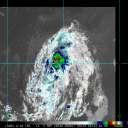Show Selection:
|
#931996 (Received by flhurricane at: 5:06 AM 08.Jul.2018)
TCDAT3
Tropical Storm Chris Discussion Number 7
NWS National Hurricane Center Miami FL AL032018
500 AM EDT Sun Jul 08 2018
An Air Force Reserve reconnaissance aircraft has been investigating
the cyclone early this morning, and found flight-level winds of 45
kt at 925 mb and believable SFMR surface winds of around 34
kt in the southeast quadrant. On this basis, the system has been
designated as Tropical Storm Chris, the 3rd named storm of the 2018
Atlantic season.
Although the winds associated with the tropical storm have increased
a little, the overall organization of Chris has not changed much
over the past few hours. The low-level center is still exposed to
the north of a broken band of deep convection and the cyclone lacks
an inner-core. Chris is located over very warm SSTs and will
remain so for the next several days. While the broad nature of the
cyclone`s circulation and some moderate shear will likely limit the
intensification rate over the next day or so, all of the intensity
guidance indicates that Chris will become a hurricane within about
72-h. By day 4, the intensity forecast is more uncertain,
and depends strongly on the timing of Chris crossing the Gulf
Stream, since the cyclone is expected to continue to intensify as
long as it remains over warm waters. Once extratropical transition
begins, weakening should occur as the wind field broadens. The new
intensity forecast is close to HCCA and IVCN through day 3, and
slightly lower beyond that, closer to the previous forecast.
The track guidance has once again made a large shift with the latest
forecast cycle. While Chris is generally expected to continue to
meander off the coast of the Carolinas for the next couple of days
before accelerating to the northeast ahead of a deep-layer trough
approaching from the northwest, the timing of this acceleration is
highly uncertain. Nearly all of the dynamical models have now
shifted to the south and west of their previous forecasts throughout
most of the forecast period. The NHC track forecast has been
adjusted in that direction, but now lies on the eastern side of the
guidance envelope, and shows a faster motion than most of the
models. Given the large run-to-run inconsistency of the guidance
over the past 24 hours, I would prefer to wait to make a more
significant change to the forecast until a more clear pattern
emerges.
The Air Force reconnaissance plane also measured winds to
gale-force about 20 miles off the coast of North Carolina. These
winds are associated with the tight pressure gradient between
Chris and high pressure over the northeastern U.S. See products
issued by the National Weather Service forecast offices for more
details.
FORECAST POSITIONS AND MAX WINDS
INIT 08/0900Z 33.0N 75.5W 35 KT 40 MPH
12H 08/1800Z 33.0N 75.4W 40 KT 45 MPH
24H 09/0600Z 32.8N 75.3W 45 KT 50 MPH
36H 09/1800Z 32.6N 75.1W 55 KT 65 MPH
48H 10/0600Z 32.7N 74.7W 60 KT 70 MPH
72H 11/0600Z 35.2N 71.5W 70 KT 80 MPH
96H 12/0600Z 41.5N 64.0W 70 KT 80 MPH
120H 13/0600Z 49.0N 54.5W 55 KT 65 MPH...POST-TROP/EXTRATROP
$$
Forecaster Zelinsky |



